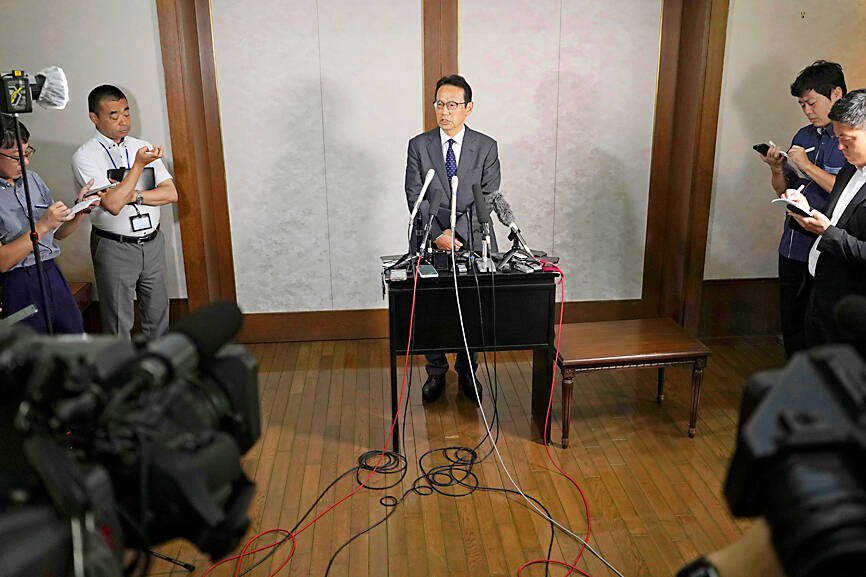A court in China yesterday sentenced a Japanese businessman to three-and-a-half years in prison for spying, Tokyo’s ambassador in Beijing said.
The man — described by Japan’s Kyodo news agency as being in his 60s and an employee of Astellas Pharma Inc, a major Japanese pharmaceutical company — was detained in March 2023.
He was charged with espionage in August last year, placed under formal arrest in October and his first hearing was held in November, but no details were released.

Photo: Kyodo News via AP
He was “sentenced to three years and six months in prison for espionage activities,” Japanese Ambassador to China Kenji Kanasugi told Japanese media after the trial in Beijing.
“It is extremely regrettable that such a guilty verdict was issued,” he said.
Chinese Ministry of Foreign Affairs spokesman Lin Jian (林劍) said China’s judicial organs “handle cases in strict accordance with the law.”
“As long as foreign personnel in China and coming to China abide by the law ... there is nothing to be worried or anxious about,” he told a regular news conference.
A total of 17 Japanese citizens with business or other connections to China have been detained since 2014, when Beijing enacted the Counter-Espionage Law of the People’s Republic of China. Five are in custody or serving prison terms in China, Japanese public broadcaster NHK said.
A Japanese diplomat was detained for questioning in 2022 and released hours later, prompting strong protests from Japan.
Kanasugi was present at yesterday’s ruling, but Japanese reporters were not allowed inside the courtroom.
He told reporters that Japan would continue to demand the early release of Japanese nationals in detention, adding that such detentions are “one of the biggest obstacles to improving people-to-people exchanges and public sentiment between Japan and China.”
Tokyo’s embassy in a statement urged China “to ensure their legitimate rights and humane treatment during detention, and to improve the transparency of the judicial process.”
The detained man reportedly worked in China for two decades and was previously a senior executive at a major Japanese business lobby in the country.
He was planning to return home before his sudden detention, Kyodo news agency reported.

Right-wing political scientist Laura Fernandez on Sunday won Costa Rica’s presidential election by a landslide, after promising to crack down on rising violence linked to the cocaine trade. Fernandez’s nearest rival, economist Alvaro Ramos, conceded defeat as results showed the ruling party far exceeding the threshold of 40 percent needed to avoid a runoff. With 94 percent of polling stations counted, the political heir of outgoing Costa Rican President Rodrigo Chaves had captured 48.3 percent of the vote compared with Ramos’ 33.4 percent, the Supreme Electoral Tribunal said. As soon as the first results were announced, members of Fernandez’s Sovereign People’s Party

MORE RESPONSIBILITY: Draftees would be expected to fight alongside professional soldiers, likely requiring the transformation of some training brigades into combat units The armed forces are to start incorporating new conscripts into combined arms brigades this year to enhance combat readiness, the Executive Yuan’s latest policy report said. The new policy would affect Taiwanese men entering the military for their compulsory service, which was extended to one year under reforms by then-president Tsai Ing-wen (蔡英文) in 2022. The conscripts would be trained to operate machine guns, uncrewed aerial vehicles, anti-tank guided missile launchers and Stinger air defense systems, the report said, adding that the basic training would be lengthened to eight weeks. After basic training, conscripts would be sorted into infantry battalions that would take

GROWING AMBITIONS: The scale and tempo of the operations show that the Strait has become the core theater for China to expand its security interests, the report said Chinese military aircraft incursions around Taiwan have surged nearly 15-fold over the past five years, according to a report released yesterday by the Democratic Progressive Party’s (DPP) Department of China Affairs. Sorties in the Taiwan Strait were previously irregular, totaling 380 in 2020, but have since evolved into routine operations, the report showed. “This demonstrates that the Taiwan Strait has become both the starting point and testing ground for Beijing’s expansionist ambitions,” it said. Driven by military expansionism, China is systematically pursuing actions aimed at altering the regional “status quo,” the department said, adding that Taiwan represents the most critical link in China’s

‘REALLY PROUD’: Nvidia would not be possible without Taiwan, Huang said, adding that TSMC would be increasing its capacity by 100 percent Nvidia Corp CEO Jensen Huang (黃仁勳) on Saturday praised and lightly cajoled his major Taiwanese suppliers to produce more to help power strong demand for artificial intelligence (AI), capping a visit to the country of his birth, where he has been mobbed by adoring fans at every step. Speaking at an impromptu press conference in the rain outside a Taipei restaurant, where he had hosted suppliers for a “trillion-dollar dinner,” named after the market capitalization of those firms attending, Huang said this would be another good year for business. “TSMC needs to work very hard this year because I need a lot